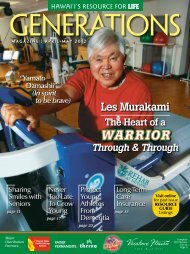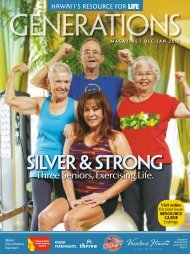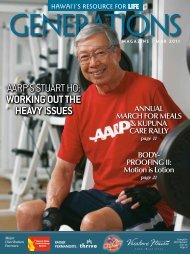Aug-Sep 2013.pdf - Generations Magazine
Aug-Sep 2013.pdf - Generations Magazine
Aug-Sep 2013.pdf - Generations Magazine
Create successful ePaper yourself
Turn your PDF publications into a flip-book with our unique Google optimized e-Paper software.
Cover story ::<br />
Up until the age of three, Al was raised in<br />
American Samoa by his maternal grandmother<br />
until his mother, Lela Su’a Paia, sent for him to<br />
join her in Honolulu where she was working as<br />
a nurse. Lela would eventually marry Roy Milbur<br />
Harrington, who Al says treated him like his own<br />
son; so much so, that Al eventually adopted his<br />
step father’s last name as his own.<br />
“I grew up in Hālawa Housing,” says Al. “Life<br />
wasn’t always easy back then, but I was very fortunate.<br />
The Lord gifted me with natural academic<br />
and athletic abilities and I was able attend Punahou<br />
School on a scholarship.” Al helped his team<br />
capture the State championship, and became the<br />
first high school All-American from Hawai‘i. His<br />
athletics and scholastic talents helped him land<br />
a scholarship at Stanford University, where he<br />
graduated with a degree in history.<br />
After Stanford, Al got married, returned to<br />
Hawai‘i, taught history and coached at Punahou<br />
School. “Money was tight,” says Al. “My wife (at<br />
that time) and I were going to have twins and I<br />
didn’t even have enough money to pay the hospital<br />
bill where they were born!” The need for extra<br />
income became Al’s entry into the entertainment<br />
business. While teaching at Punahou, Al moonlighted<br />
as a performer at a luau in Waikiki.<br />
Al Harrington (first from the left) on the set with the<br />
cast of Hawai‘i Five-0.<br />
During one of those performances, Hawai‘i Five-O<br />
casting director, Ted Thorpe, who worked for<br />
Leonard Freeman, creator of Hawai‘i Five-O was<br />
in the audience. That was when Al was recruited<br />
and landed the role of Detective Ben Kokua in the<br />
original Hawai‘i Five-O. Life for Al would never<br />
be the same.<br />
Next, Al moved on to headline the “Al Harrington<br />
Show” in Waikīkī for more than 20 years.<br />
Affectionately known as “The South Pacific Man,”<br />
Al’s popularity in the ‘70’s and ‘80’s made him a<br />
household name. He, along with other entertainers<br />
such as Don Ho, Dick Jenson, Danny Kaleikini,<br />
and Moe Keale (Uncle of Brother Iz) all helped<br />
define Hawai‘i’s entertainment industry, promoting<br />
Polynesian-style song and dance to tourists from<br />
around the world.<br />
After the Al Harrington Show ended in 1992,<br />
Al moved to Utah and later to Los Angeles where<br />
he enjoyed a successful movie career, acting as a<br />
Native American Indian in a number of films, including<br />
a starring role in Disney’s White Fang 2.<br />
In 2005, Al returned to Hawai‘i where he has<br />
continued his role as educator, actor, entertainer<br />
and healer.<br />
GM: You’ve certainly lived a life full of adventure<br />
and unexpected turns. How is life as a senior<br />
treating you?<br />
AH: You know, the term ‘senior’ is really misleading<br />
and I don’t refer to myself or others in that<br />
way. People think of seniors as folks who have<br />
one foot in the grave; and that pretty soon, life<br />
as you know it is going to be “all pau.” But, nothing<br />
could be further from the truth! The whole<br />
concept of growing older is really a concept of<br />
positive growth, coming alive, coming into your<br />
own — being content with yourself. As you age<br />
you develop the wisdom, experiences and tools<br />
to help navigate through life’s ups and downs.<br />
GM: Most people know you as ‘Al Harrington’<br />
the entertainer and actor, but tell me about<br />
your role as an educator.<br />
AH: I’ve always considered myself an educator,<br />
first and foremost. Education is really the crux of<br />
everything we do, even on the football field. I’ve<br />
had some of my most fulfilling moments in life<br />
as a teacher. When I was teaching at Punahou,<br />
I had some pretty smart kids in my class. Heck,<br />
some were probably even smarter than me! I had<br />
to figure out a way to help engage them in the<br />
learning process and to teach them the best lesson<br />
of all — never stop learning. I’ve had some wonderful<br />
teachers in my life that have taught me<br />
that life is a process and that process never ends.<br />
GM: How is your life as an educator helping<br />
others today?<br />
AH: Simplification is education. That’s what education<br />
is supposed to do. A good teacher will take<br />
a seemingly complicated topic and make it easy<br />
to understand. Many people who are approaching<br />
Medicare eligibility find it can be difficult to<br />
understand Medicare — there’s Parts A, B, C and D<br />
and many rules and regulations. Somehow, we’re<br />
supposed to know what to do and when. Just<br />
receiving that 2-inch-thick Medicare book in the<br />
mail is enough to make your head spin!<br />
Taking care of our health by getting regular<br />
health checkups and screenings with the right<br />
health insurance coverage in place at reasonable<br />
costs is crucial for us at this time in our life.<br />
So, understanding Medicare benefits pays in<br />
many ways.<br />
GM: Is that why you’ve become the spokesperson<br />
for AlohaCare?<br />
AH: Yes! Partnering with AlohaCare has allowed<br />
me to share my message with my generation.<br />
When I was living in Los Angeles, I was diagnosed<br />
with prostate cancer. At that point, I was<br />
ready to just give up and check out of life. It was<br />
all very overwhelming. But I was blessed. I had<br />
someone in my life that helped me through the<br />
process. She met with my doctors and worked<br />
with them to figure out what kind of treatment<br />
I needed and what kind of health coverage I had.<br />
The combination of my employer coverage and<br />
Medicare made all the difference in making sure<br />
I had all the benefits I needed for a full recovery.<br />
p 16 | | p 17





